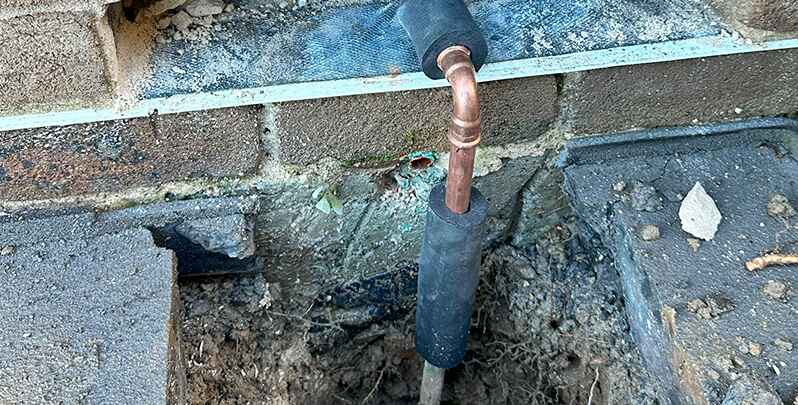Why Do Water Pipes Burst in Winter?

Amid winter’s icy grip, the phenomenon of water pipes bursting remains a major concern for homeowners across the globe. As temperatures drop and the season’s chill sets in, plumbing systems’ vulnerability becomes increasingly apparent.
A burst water pipe can lead to extensive water damage, costly repairs, and significant disruptions to daily life. But why does this happen?
The Science of Bursting Pipes
Expansion and contraction of water is what causes pipes to burst. What does that mean? Keep reading:
Pipes Burst: An Overview
At its core, the phenomenon of pipes bursting in winter results from the expansion and contraction of water within the plumbing system. When subjected to freezing temperatures, water molecules transform into ice and expand.
This expansion exerts immense pressure on the walls of the pipes, making them vulnerable to rupture. When the pressure becomes too great for the pipes to withstand, they burst, unleashing a torrent of water that can cause havoc within your home.
Cold Air and Vulnerable Pipes
One of the primary culprits behind a burst pipe is cold air infiltration. As temperatures plummet, the cold air infiltrates various spaces within your home, including crawl spaces, attics, and basements.
When exposed to this frigid air, pipes are at risk of freezing. Pipes in vulnerable areas, lacking proper insulation or protection, are particularly susceptible.

Preventive Measures: Shielding Your Plumbing System
It’s advisable to take preventive measures to protect your plumbing system during winter months. These methods include:
Insulation is Key
Insulation emerges as a crucial ally to shield your plumbing pipes from winter’s wrath. Adding more insulation to vulnerable pipes can help retain heat and stave off the freezing temperatures that lead to burst pipes.
A trusted plumber focuses on areas such as crawl spaces, attics, and basements, as these tend to be the coldest spots in your home.
Let Warm Air Flow
Allowing warm air to circulate your pipes is another effective strategy. Leaving cabinet doors open, especially those beneath sinks, enables warm air to reach the pipes, mitigating the risk of freezing.
Similarly, consider leaving a trickle of water running through one or two faucets. The movement of water can prevent it from freezing within the pipes.
Sealing Leaks and Weatherproofing
Professional sealing leaks in your home can significantly reduce the influx of cold air. They will apply weather stripping around windows and doors and seal any gaps or cracks that could allow cold air to infiltrate your home.
Ensuring that your home is well-insulated and sealed against the elements can go a long way in safeguarding your plumbing.
The Role of Temperature
Temperature is the most important factor to consider when it comes to burst pipes.
Understanding Water Temperature
The temperature of the water flowing through your pipes also plays a vital role in preventing bursts. Cold water from the main supply can significantly lower the overall temperature of your plumbing system.
To counter this, consider slightly increasing the temperature of your water heater during the winter months. This can help maintain a consistent temperature within your pipes, reducing the risk of freezing.
Maintaining a Steady Flow
Another strategy is to maintain a steady water flow within your plumbing system. Stagnant water is more likely to freeze, which can bring cold air, increasing the likelihood of burst pipes.
Regularly using water, even in small amounts, helps prevent water from becoming stagnant and freezing within the pipes.
Regular Maintenance: A Winter Ritual
Prevention is always better than cure, which is why it’s crucial to have your pipes checked annually.
Prioritise Regular Inspections
As the cold season approaches, it’s crucial to have a plumbing inspection with an expert. They will identify areas prone to cold air infiltration or enough cold air to cause pipes to freeze and fortify them with insulation and heat tape. A qualified plumber will check for leaks and address them promptly to prevent the influx of cold air.
Summer Months Matter
Don’t overlook the importance of summer months in preparing for winter. Regular maintenance services during the warmer seasons can save you great trouble later on.
They will address any weak points, insulate vulnerable pipes, and ensure that your plumbing system is well-prepared to face the challenges of winter.
Get Ahead of Winter Woes: Partner with Upside Down Plumbing Today!
Understanding the reasons behind burst water pipes becomes paramount when facing the frosty spectre of winter. At Upside Down Plumbing, we’ve unravelled the mysteries of frozen pipes, delved into the impact of cold temperatures, and shared valuable insights to prevent burst pipes.
As winter’s cold breath looms, empower yourself with knowledge and practical solutions to ensure a hassle-free season. Trust Upside Down Plumbing to keep your plumbing safe and sound throughout winter and beyond.
Please note: This information is provided for advice purposes only. Regulations differ from state to state, so please consult your local authorities or an industry professional before proceeding with any work. See our Terms & Conditions here.